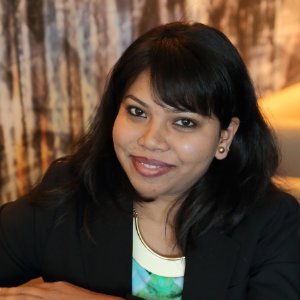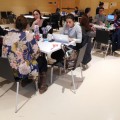 Devashree Ghosh earned her Master’s degree in Environmental Policy and Sustainability Management (EPSM) from the Milano School of International Affairs, Management and Urban Policy at The New School in Spring 2015. Before coming to The New School, this recent alum worked to reduce factory-related operating costs through energy efficiency and water conservation projects in Special Economic Zones in India.
Devashree Ghosh earned her Master’s degree in Environmental Policy and Sustainability Management (EPSM) from the Milano School of International Affairs, Management and Urban Policy at The New School in Spring 2015. Before coming to The New School, this recent alum worked to reduce factory-related operating costs through energy efficiency and water conservation projects in Special Economic Zones in India.
What brought you to Milano’s EPSM program and The New School?
The New School is well known in the community for its programs in design and social research. Their students and faculty have been change-makers, which resonated strongly with my career vision. The urban campus in New York City also attracted me to choose The New School.
How did your studies at Milano set you on the career path you envisioned for yourself?
Way back in 2005, having worked for factories with minimal resources made me realize the value of natural resources in our ecosystem. At times, the lake that provided water for wet-processing and other water-intensive processes in the textile industry also served as the dump-site for waste-water. From those times to setting up an effluent water treatment plant was an eye-opening journey for me and I wanted to take that experience a notch ahead. Energy security is the backbone of economic well-being. Strategic directives thrive on a platform of strong energy-based calculations and analytics. That is where I wanted to be, driving change from the top-down. When I joined the EPSM program, I envisioned myself working in the corporate sector driving sustainability practices and developing strategy to use natural resources efficiently.
Your research on climate instability took you to the Qinghai-Tibet Plateau. What was that experience like?
One of the courses that I took was “Sustainability in India and China”. It was a unique course that constituted of five renowned professors travelling from India and China. Not only was the classroom experience unique but it also triggered my interest to travel to China for research on climate instability in the Qinghai Tibetan Plateau. Through the India China Institute and the Starr Foundation, I won a grant to travel to China in the summer of 2013. This trip was challenging from all aspects and The New School helped me gear up for it in every way. Professor Nidhi Srinivas guided every step of designing my field research. I took advantage of learning Mandarin level 1 offered at school and then the constant support and network of fellow grant awardees made the whole experience one to remember. In China, I visited several herding families in the plateau region to gather primary data for my research, met other researchers and gained firsthand experience through the fieldwork. The entire experience boosted my confidence in the area of environmental policy and sustainability in China.
What advice would you give to new Milano students to help them make the most of their time here?
I would definitely say that engage with your peers, often there might be a person sitting right next to you who has been in the industry for decades and brings a wide range of experiences. The New School is certainly very involved in the local community and being involved in community projects provide as much of learning as a hands-on-internship.
You were very involved in a variety of projects while a student. How did you benefit from that experience?
I worked on campus-wide projects that involved active engagement with students, faculties and even facilities. I feel that it interweaved experience and expertise in the area I was building my career in. The New School offers bright scholars and faculty at every step who are willing to collaborate and lead. Working on projects in waste management, product development, event management certainly benefited me as an individual. To a great extent I owe my learning to my peers and these campus-wide engagements.
You were awarded the prestigious Environmental Defense Fund (EDF) post-graduate Climate Corps fellowship. What did you work on at EDF?
The City of Hoboken in partnership with Greener by Design enlisted my help to develop a Resilient Microgrids Toolkit. In October of 2012, the City of Hoboken was devastated by Superstorm Sandy, with approximately 70 percent of the city having been flooded. In the aftermath, Mayor Dawn Zimmer as well as many other city stakeholders came to understand that a microgrid might be a way to “keep the lights on” and also enable citizens to shelter safely in place during the next big storm. My role in this large project was to create a shareable and user-friendly toolkit that would engage stakeholders and provide them with the tools necessary to navigate the tricky process of establishing a clean and resilient microgrid. Cities up and down the east coast look just like Hoboken and face the same challenges due to rising sea levels, increased dependence on energy and worsening storms; therefore, this toolkit was conceived to be not just for Hoboken, but for any city that could benefit from a resilient microgrid.
What are you doing these days?
I am currently working as a Strategy Consultant with Greener By Design in the areas of clean energy and sustainability for several cities and townships in New Jersey.
My projects are related to microgrid feasibility studies, coastal vulnerability analysis, energy savings and carbon abatement plans for municipal buildings. Apart from that I am also collaborating with universities, utility providers, sustainability advisers to continue working on the Resilient Microgrids Toolkit that I envisioned for increasing the resiliency of critical infrastructure in cities and towns.




